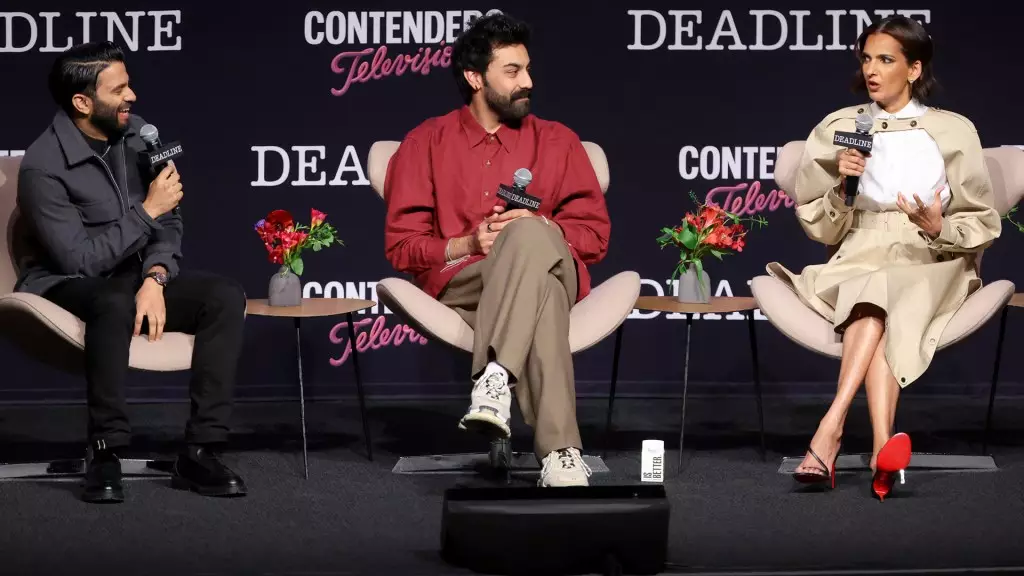In the landscape of television, traditional roles often dictate who gets to wear the mask of power and aggression. However, Poorna Jagannathan’s portrayal of Lucky Auntie in Hulu’s comedy series *Deli Boys* flips the script, showcasing how gender norms can be challenged through nuanced storytelling. Originally conceived as a male character, Lucky Auntie was reshaped into a fierce yet nurturing figure, thanks to the insight of Geena Davis. This groundbreaking move not only redefined the character but also led to a compelling discourse on representation in media, particularly for South Asian women—and indeed, for women in general.
Abdullah Saeed, the series creator, transformed his vision upon hearing Davis’s urging to modify male roles into female ones. This decision is monumental in the context of the entertainment industry, which typically restricts complex, gritty narratives to male characters. By offering Lucky Auntie this unique blend of toughness and femininity, Saeed presents an evolved perspective on what it means for women to occupy traditionally male-dominated spaces—whether they be physical confrontations or emotional spectrums.
The Duality of Power and Nurture
Jagannathan’s performance encapsulates the essence of duality, effectively merging strength with tenderness. As she describes it, Lucky Auntie is not just a “badass”—she embodies a complexity rarely afforded to female characters. Her character is involved in intense, dangerous situations, employing both brute force and quick-thinking tactics, such as shooting one enemy while simultaneously executing another. Yet, simultaneously catering to her family—bloodied or otherwise—her character nurtures her nephews Mir and Raj, bridging the gap between intimidation and caregiving.
This juxtaposition resonates across the spectrum of female representation, illustrating that women can possess hardened exteriors without sacrificing their emotional depth. It reflects an inherent truth found in many cultures, particularly in South Asian contexts, where women often play the dual role of caretakers and warriors. For Jagannathan, appearing in such a role signifies breaking away from the stereotype of the submissive female, allowing her to inhabit a space where she can be both caregiver and combatant.
Breaking Stereotypes and Creating Space
The significance of a South Asian woman commandeering such a fierce role cannot be overstated. The entertainment industry has an extensive history of casting women of color within narrow confines—usually as demure, submissive characters. Lucky Auntie disrupts these stereotypes, exposing the audience to a reality where South Asian women are multi-dimensional. Jagannathan skillfully combines a confrontational edge with nurturing instincts, challenging the paradigm of who gets to be strong in media narratives.
This bold representation has broader implications for the portrayal of women in film and television. It acknowledges the necessity of seeing diverse narratives that encompass different cultural backgrounds, not as caricatures but as complex individuals. It also opens the door for future storytellers to delve into creating multifaceted characters that reflect a modern and authentic landscape.
A New Era for Women in Action
Jagannathan’s role in *Deli Boys* stands as a testament to the gradual, yet crucial evolution of female characters within the action-comedy genre. Characters like Lucky Auntie are essential for cultivating a new breed of storytelling—one in which women are not solely relegated to romantic interests or nurturing roles, but rather can exhibit the full spectrum of human emotion and capability.
The balance of masculine energy and softness in Lucky Auntie reminds viewers that one does not need to forgo being nurturing to assume a position of power. As the series explores these themes, it invites the audience to engage in a crucial conversation about gender and power dynamics, pushing the boundaries of how narratives can represent strength in all its forms. By redefining what it means to be capable and fierce, *Deli Boys* emerges not just as a comedic series, but as a pioneering piece that encourages women, particularly women of color, to take their rightful place in powerful narratives.
